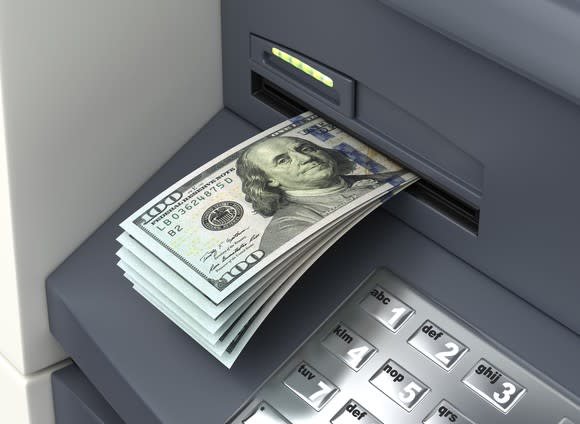3 Dividend Stocks That Pay You Better Than ExxonMobil Does
ExxonMobil has been a boon to long-term investors over the years, with the stock returning over 3,000%. The company also has a long track record of payouts dating back to 1911, and it has raised its dividend by 6.3% annually, on average, going back 35 years.
More recently, though, the company has fallen on hard times, and the stock has fallen 32% from its five-year peak. The volatility of oil prices over the last several years and recent issues with lagging production volumes have pushed the stock to five-year lows, forcing its yield above 4%.
Investors doubtful of ExxonMobil's future prospects may be looking elsewhere for a stock with a higher yield. With that in mind, we asked three Fool.com contributors to choose solid income payers that they believed might represent a better option. Read on to find out why they chose Philip Morris International (NYSE: PM), AT&T (NYSE: T), and National Retail Properties (NYSE: NNN).

Image source: Getty Images.
Tobacco stocks still pay high yields
Leo Sun (Philip Morris International): Marlboro maker Altria spun off all of its overseas businesses as Philip Morris International a decade ago. PMI is now the second largest publicly traded tobacco maker after British American Tobacco.
PMI has struggled with revenue growth, due to waning smoking rates across the world. But just like Altria, PMI offsets that sluggishness by raising cigarette prices and cutting costs. It's also diversifying its portfolio with new products like its iQOS devices, which heat instead of burning tobacco sticks.
That's why PMI's adjusted revenue (which excludes excise taxes and currency impacts) still rose 9% annually in fiscal 2017, as its adjusted earnings (excluding the same impacts and one-time tax charges) grew 10%. For the current year, analysts expect its adjusted revenue and earnings to grow 3% and 8%, respectively.

Image source: Getty Images.
Those growth rates may seem unimpressive, but the stock trades at just 15 times forward earnings and pays a hefty forward dividend yield of 5.4%. It spent just 78% of its free cash flow on that dividend over the past 12 months, and it's raised its payout every year since it split with Altria. This means while some investors might avoid PMI due to ethical objections, the stock's low valuation and high yield should limit its downside potential.
A high yield and growing prospects
Chris Neiger (AT&T): While ExxonMobil has a very impressive dividend yield, it's no match for AT&T's. The telecom company's forward yield is 6.1%, which is not only higher than the oil giant's 4% yield, but AT&T also has a lower payout ratio than ExxonMobil: 38.7% vs. 63.7%. That means AT&T has plenty of room to continue to raise its dividend, just as it has consistently for the past 33 years.
AT&T is mainly comprised of its wireless business, and the industry as a whole is experiencing a major upheaval as telecoms look for long-term growth prospects that don't involve fighting to win over smartphone customers. That's why AT&T's recent acquisition of Time Warner's content assets is so promising. The company won the deal's approval from a judge back in June (the Department of Justice is appealing the ruling), and the acquisition gives AT&T ownership of HBO's 142 million subscribers, Warner Bros. content and talent, and television channels from Turner, including CNN.
Not only does the acquisition vastly expand AT&T's media footprint, it also opens up the company to lots of new business opportunities, including bundling wireless services and content together as well as tapping into user data across multiple content streams to serve highly targeted ads to users.

Actress Emilia Clarke in a scene from HBO's Game of Thrones. Image source: HBO.
Aside from these new prospects, AT&T is also focusing on how it can continue to expand its wireless business. The company is working on 5G tests across the country, and it has plans to bring mobile 5G to 12 cities by the end of the year. 5G is expected to become the next wireless standard over the next few years, and competition is already beginning to heat up among telecoms. The new standard will not only increase wireless speeds and help enable more Internet of Things devices to come online, but it's also expected to grow into a massive $251 billion market by 2026.
AT&T's sky-high yield and it's long history of dividend increases mixed with its 5G wireless prospects and recent Time Warner acquisition mean the company is both looking out for its shareholders while also setting itself up for future growth. Investors looking for a dividend yield that easily outpaces ExxonMobil's -- and want to bet on the next evolution in the telecom industry -- should give AT&T strong consideration.
Don't judge a book by its cover
Danny Vena (National Retail Properties): With the changing retail landscape, many investors have been avoiding anything remotely related to retail. That's understandable, considering the troubling financial results posted by a number of high-profile retailers, the proliferation of headlines about the "retail apocalypse," and the decline of the venerated shopping mall.
Those same fears might persuade investors to give a wide berth to National Retail Properties, but first impressions can be misleading. Not all brick-and-mortar businesses will fall victim to e-commerce. Think about gas stations, movie theaters, fitness centers, convenience stores, and restaurants. These businesses account for the majority of National Retail Properties' tenants, with a current occupancy rate of 98.5%.

Image source: Getty Images.
These single-tenant properties sign leases that typically run between 10 and 20 years and contain provisions for automatic rent increases. The average remaining lease term is 11.5 years, providing significant stability to the portfolio. Tenants are also responsible for ongoing costs like utilities, maintenance, insurance, and property taxes.
The company's diversified portfolio of 2,846 properties in 48 states boasts a total gross leasable area of over 29 million square feet, with more than 400 tenants across 37 industries.
National Retail Properties also qualifies as a special classification of tax-advantaged companies known as real estate investment trusts (REIT), which aren't taxed at the corporate level, but are required to pay out 90% of profits to shareholders in the form of dividends.
The company has the enviable distinction of having increased its dividend in each of the past 29 years, landing it on the list of Dividend Aristocrats. Just as impressive is the company's 25-year average annual total return: 12.5% with a current yield of 4.4%.
Investors looking for a superior alternative to ExxonMobil need look no further than National Retail Properties.
More From The Motley Fool
Chris Neiger has no position in any of the stocks mentioned. Danny Vena has no position in any of the stocks mentioned. Leo Sun owns shares of AT&T. The Motley Fool has no position in any of the stocks mentioned. The Motley Fool has a disclosure policy.
